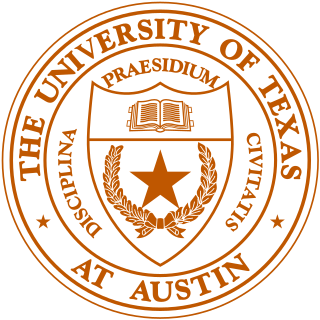
TheUniversity of Texas at Austin is a public research university in Austin, Texas, founded in 1883. The University of Texas was included in the Association of American Universities in 1929. The institution is composed of over 50,000 undergraduate and graduate students and over 24,000 faculty and staff.

The Graduate School and University Center of the City University of New York is a public research institution and post-graduate university in New York City. Serving as the principal doctorate-granting institution of the City University of New York (CUNY) system, The Graduate Center is classified among "R1: Doctoral Universities – Very High Research Activity". The school is situated in the landmark B. Altman and Company Building at 365 Fifth Avenue in Midtown Manhattan, opposite the Empire State Building. The Graduate Center has 4,600 students, 31 doctoral programs, 14 master's programs, and 30 research centers and institutes. A core faculty of approximately 140 is supplemented by over 1,800 additional faculty members drawn from throughout CUNY's eleven senior colleges and New York City's cultural and scientific institutions.

Baylor College of Medicine (BCM) is a private, independent health sciences center in Houston, Texas within the Texas Medical Center, the world's largest medical center. BCM is composed of four academic components: the School of Medicine, the Graduate School of Biomedical Sciences; the School of Health Professions, and the National School of Tropical Medicine.
The University of Texas Health Science Center at Houston (UTHealth) is a public academic health science center in Houston, Texas. It was created in 1972 by The University of Texas System Board of Regents. It is located in the Texas Medical Center, the largest medical center in the world. It is composed of six schools: McGovern Medical School, The University of Texas MD Anderson Cancer Center UTHealth Graduate School of Biomedical Sciences, UTHealth School of Dentistry, Cizik School of Nursing, UTHealth School of Biomedical Informatics and UTHealth School of Public Health.

The Association for Psychological Science (APS), previously the American Psychological Society, is an international non-profit organization whose mission is to promote, protect, and advance the interests of scientifically oriented psychology in research, application, teaching, and the improvement of human welfare. To this end, APS publishes several journals, holds an annual meeting, disseminates psychological science research findings to the general public, and works with policymakers to strengthen support for scientific psychology.
The McCombs School of Business, also referred to as the McCombs School or simply McCombs, is a business school at The University of Texas at Austin (U.S.). In addition to the main campus in Downtown Austin, McCombs offers classes outside Central Texas in Dallas, and Houston. The McCombs School of Business offers undergraduate, master's, and doctoral programs for their average 13,000 students each year, adding to its 98,648 member alumni base from a variety of business fields. In addition to traditional classroom degree programs, McCombs is home to 14 collaborative research centers, the international business plan competition: Venture Labs Investment Competition, and executive education programs.
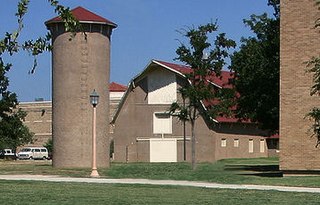
Agricultural Education is the teaching of agriculture, natural resources, and land management. At higher levels, agricultural education is primarily undertaken to prepare students for employment in the agricultural sector. Classes taught in an agricultural education curriculum may include horticulture, land management, turf grass management, agricultural science, small animal care, machine and shop classes, health and nutrition, livestock management, and biology.
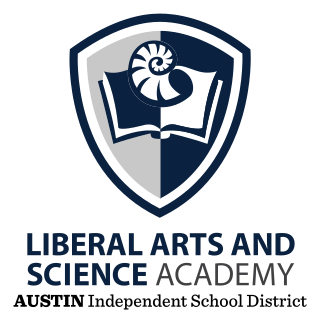
Liberal Arts and Science Academy (LASA) is a selective public magnet high school in Austin, Texas, United States. Although LASA is open to all Austin residents and charges no tuition, competition for admission can be strong and is contingent on submission of an application, prior academic record, and the Cognitive Abilities Test. LASA is sometimes known as LASA High School.

Deakin University's School of Medicine is based at the Waurn Ponds campus in Geelong, Victoria, Australia. It offers a four-year, graduate-entry, Doctor of Medicine (MD) degree.
The Jackson School of Geosciences at The University of Texas at Austin unites the Department of Geological Sciences with two research units, the Institute for Geophysics and the Bureau of Economic Geology.

The College of Natural Sciences at The University of Texas at Austin offers 10 Bachelor of Arts majors, 42 Bachelor of Science majors, and 20 graduate programs to more than 11,000 undergraduates and 1,400 graduate students. The college employs over 370 faculty. Many of the programs are consistently ranked in the top ten nationally, according to U.S. News & World Report (2019), including: Analytical Chemistry (4th), Applied Math (9th), Artificial Intelligence (8th), Computer Science (10th), Computing Systems (8th), Computing Theory (7th), Cosmology/Relativity/Gravity (10th), Ecology, Evolution and Behavior (6th), Mathematics Analysis (7th), Plasma Physics (3rd), Programming Language (8th), and Topology (8th). It was established in 1883.
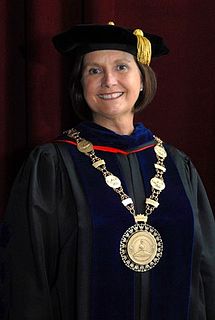
Betsy Vogel Boze, is an American academic and higher education administrator. During her career at public universities she has been a professor of marketing, department chair, dean, CEO of Kent State University at Stark, and president of The College of The Bahamas. She is a senior fellow at the American Association of State Colleges and Universities (AASCU) researching alternative revenue streams for public colleges and universities.
The Special Class for the Gifted Young is a program aimed to select gifted young students to enter the universities in China. First established in 1978 at the University of Science and Technology of China, it was a major innovation in China's higher education. The idea was suggested by renowned scientists such as Tsung-Dao Lee, C. N. Yang, and Samuel C. C. Ting, and supported by the then Vice-premier of the State Council Fang Yi. The objective of the class is to explore the most efficient ways to nurture promising youth. Peking University, Tsinghua University, Nanjing University, Wuhan University, Jilin University, Shanghai Jiaotong University and Huazhong University of Science and Technology also launched similar programs. But they were all shut down for all kinds of reasons. Currently, only the University of Science and Technology of China and Xi'an Jiaotong University still have this program.

The University of Texas at Austin School of Architecture (UTSOA) is a college within The University of Texas at Austin, with its major facilities located on the main university campus in Austin, Texas. UTSOA's dean is Michelle Addington. In 2016, the school's former dean, Frederick "Fritz" Steiner, stepped down citing Texas Government Code Section 411.2031, also known as "Campus Carry," which entitles licensed individuals to carry concealed handguns onto the campus of an institution of higher education.
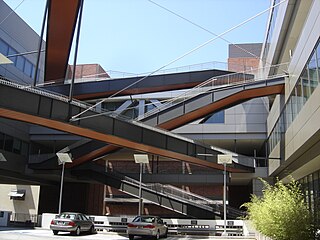
The California NanoSystems Institute (CNSI) is an integrated research center operating jointly at UCLA and UC Santa Barbara. Its missions are to foster interdisciplinary collaborations for discoveries in nanosystems and nanotechnology; train the next generation of scientists, educators and technology leaders; and facilitate partnerships with industry, fueling economic development and the social well-being of California, the United States and the world.

Imam Khomeini International University (IKIU) is an international university in Iran that was founded after the Islamic Revolution. The bill of IKIU’s constitution was ratified by the Iranian Parliament in January 1984. Constituent organs of IKIU include Board of trustees, president, and council. Deputies for Education, Research, and Students and Culture are some of the other departments. In addition, there is a Science and Technology Park, and central library with more than 100000 books and magazines.
Utpal Banerjee is a Distinguished Professor of the Department of Molecular, Cell and Developmental Biology at UCLA. He obtained his Bachelor of Science degree in Chemistry from St. Stephen's College, Delhi University, India and obtained his Master of Science degree in Physical Chemistry from the Indian Institute of Technology, Kanpur, India. In 1984, he obtained a PhD in Chemistry from the California Institute of Technology where he was also a Postdoctoral Fellow in the laboratory of Seymour Benzer from 1984-1988.
Math in Moscow (MiM) is a one-semester study abroad program for North American and European undergraduates held at the Independent University of Moscow (IUM) in Moscow, Russia. The program consists mainly of math courses that are taught in English. The program was first offered in 2001, and since 2008 has been run jointly by the Independent University of Moscow, Moscow Center for Continuous Mathematical Education, and the Higher School of Economics (HSE).
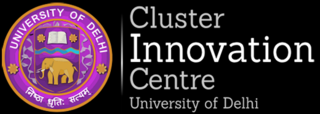
The Cluster Innovation Centre (CIC) is a Government of India funded institute established under the aegis of the University of Delhi. It has been founded in 2011 and introduced Innovation as a credit based course for the first time in India.

Established in 1965, Central Department of Chemistry, Tribhuvan University is one of the first science departments that has been commenced by Tribhuvan University as a branch of Tri-Chandra Campus for the beginning of an advanced course of Science in Nepal, which only provided the course in Organic Chemistry then.















